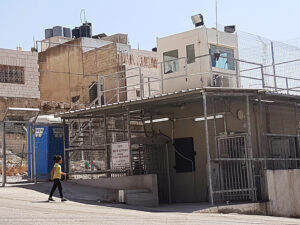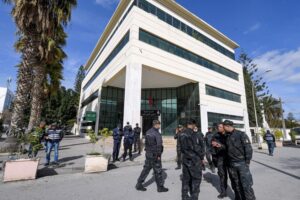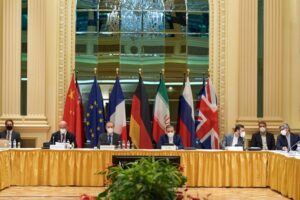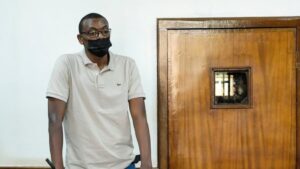
The National Interest Foundation Newsletter
Issue 133, February 10, 2022
Welcome to our NIF Newsletter. In this week’s headlines: an Amnesty International report details Israel’s subjecting of Palestinians to a system of apartheid, Tunisian President Kais Saied draws fresh criticism for dissolving the country’s Supreme Judicial Council, Iran nuclear talks resume in Vienna as negotiations enter the final stages, and the United States and the European Union raise concerns over a recent uptick in human rights abuses by Ugandan security forces.
Report on Israeli Apartheid

The Amnesty International report is just the latest investigation by a prominent rights group to highlight Israel’s apartheid policies. (Photo from B’Tselem)
An Amnesty International Report Details Israel’s Subjecting of Palestinians to a System of Apartheid
A recent report released by human rights group Amnesty International has labeled Israel as an apartheid state, and detailed the oppression of Palestinians at the hands of the Israeli government. The prominent global rights watchdog reached its findings through close examinations of exclusionary and discriminatory laws, policies, and practices, as well as the aimed intent behind these. Amnesty International determined that these laws and practices were put into effect by the Israeli government in an attempt to establish a Jewish demographic hegemony across Israel and illegally-occupied Palestine. Some of the Israeli methods outlined in the report include “territorial fragmentation, segregation through the denial of equal status, restrictions on movement, discriminatory family reunification laws, and the dispossession of land and property,” among others. Amnesty International emphasized that the intent is equally as important as the discriminatory actions themselves, with clear evidence of the behavior being a systematic effort. In the preceding years, Human Rights Watch, the United Nations, B’Tselem, and others have denounced and shed light on Israel’s system of apartheid and Amnesty International is just the latest to echo this sentiment.
Saied Dissolves Judicial Council

Saied’s move to disband the Supreme Judicial Council has been met with condemnation by pro-democracy advocates. (Photo from AFP)
Tunisian President Kais Saied Draws Fresh Criticism for Dissolving the Country’s Supreme Judicial Council
Tunisian President Kais Saied has drawn increasing criticism for a continuous string of anti-democratic actions in the aftermath of his power grab in July of last year. Recently, Saied announced that he would be unilaterally dissolving the country’s Supreme Judicial Council which plays an important role and deals with ensuring the independence of judges. The Supreme Judicial Council has referenced Article 80 of the Tunisian Constitution, and pointed out that there is no legitimate constitutional or legal mechanism that gives Saied the right to initiate such an action. The move is yet another example of the anti-democratic behavior that Saied has exhibited over the past six months. Dismantling judicial oversight is a very common strategy to consolidate power and avoid any repercussions for further intended authoritarian-like measures. The practice has been replicated in multiple repressive states, and pro-democracy advocates are particularly concerned due to the fact that Saied has indefinitely suspended the parliament and as such, the judicial council is one of the last remaining checks on executive power.
Latest on Iran Nuclear Talks

The negotiation participants reconvened in the Austrian capital city of Vienna this week. (Photo from AFP)
Iran Nuclear Talks Resume in Vienna as Negotiations Enter the Final Stages
On Tuesday of this week, delegations from Iran, China, Russia, France, Germany, the United Kingdom, and the United States reconvened in the Austrian capital city of Vienna to take part in the final stretch of the current Iran nuclear deal talks. The negotiations are aimed at reviving the Joint Comprehensive Plan of Action (JCPOA), the 2015 nuclear agreement that the United States abandoned under the previous Trump administration. In the latest series of talks so far, which have been ongoing for 10 months since April of 2021, there have been enough signs of progress to show that negotiations are entering a critical phase. There are still several unresolved issues that could throw a wrench in the talks including the scope of sanctions relief for Iran, the order in which concessions will be made, the mode of verification, Iran’s compliance process, and a guarantee that the United States will not back out of the agreement this time. The most recent sign of progress came with the restoration of sanctions waivers, and the U.S. State Department is hopeful that this will further help aid talks in Vienna. The Biden administration has indicated a February deadline to salvage the agreement, or otherwise they may revert back to more aggressive tactics in their dealings with Iran’s nuclear program.
Human Rights Abuses in Uganda

The alarm comes amid disturbing accusations of torture levied against security forces by a Ugandan author. (Photo from AP)
The United States and the European Union Raise Concerns Over a Recent Uptick in Human Rights Abuses by Ugandan Security Forces
The United States and the European Union have recently raised alarms over allegations of torture by Ugandan security forces. The catalyst for their concern is the reports of a Ugandan writer and government critic, Kakwenza Rukirabashaija. The novelist posted photos of the deep scars on his back, drawing anger and outrage from human rights activists. Rukirabashaija claims that he was tortured for weeks until a magistrate ordered him to be freed late last month. He was later denied his passport after release. This is just one of the many cases in a notable recent uptick of human rights abuses in Uganda. For more than a year, there has been a significant increase in arbitrary arrests, forced disappearances, harassment, and torture. There have also been reports of attacks against human and environmental rights activists. Rukirabashaija has fled Uganda, and is currently being charged with “offensive communication” due to a remark that he made regarding President Yoweri Museveni’s son.
